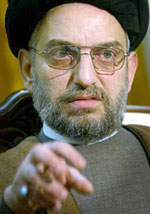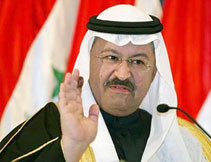|
Iraqi Sunnis Could Veto Constitution
 |
|
“These
powers have this card up to their sleeve and will definitely play
it when necessary,” said Kubeisi.
|
Additional
Reporting by Alaa Abul Eneen, IOL Staff
BAGHDAD,
February 1 (IslamOnline.net & News Agencies) – As the vote count
moves ahead in Iraq to choose a National Assembly which will draft
later a permanent constitution, the much-hoped code looked virtually
at stake as Iraqi Sunnis could veto it when a referendum is held in
October.
Anti-occupation
Sunni powers, which boycotted the January 31 vote, mull using the veto
weapon if they were marginalized in drafting the constitution by the
Shiites and the Kurds, a senior official with the influential
Association of Muslim Scholars (AMS) revealed on Tuesday, February 1.
“These
powers have this card up to their sleeve and will definitely play it
when necessary in accordance with the interim constitution,” Mahdi
Al-Kubeisi told IslamOnline.net.
Under
rules agreed last year, an October referendum to ratify that draft
will fail if two-thirds of the voters in any three of Iraq's 18
provinces give it the thumbs-down.
Main
Sunni groups shunned the election. The AMS said the poll could not be
free with occupation troops on Iraqi soil.
The
Islamic Party, which is represented in the interim government,
withdrew saying violence precluded a fair vote.
“If
we resorted to this option, the new government formed by the National
Assembly will find itself in a constitutional limbo as it will have to
set stage for a new constitution, which means holding a new
parliamentary election,” Kubeisi added.
Courting
Sunnis
The
AMS official further revealed that US-backed Iraqi powers are courting
Sunni leaders to head off a potential Sunni veto in October.
“They
are talking now about holding a national congress to enhance national
dialogue. The European Union has been the last one to jump on the
bandwagon,” Kubeisi told IOL.
Sunnis's
numerical strength in at least three provinces north and west of
Baghdad gives them the votes to throw the political process into
disarray, Reuters news agency reported Tuesday.
That
is one reason why calling for “inclusion” has been a constant
post-election refrain from Iraqi politicians, US President George W.
Bush and foreign leaders around the world.
Only
smaller Sunni groups have participated in the election such as those
led by pro-Western elder statesman Adnan Pachachi and interim
President Ghazi Al-Yawer.
Even
without assembly seats, such figures could be drafted into the
government or a constitution-writing committee, but question marks
hang over their credibility among Sunni masses, Reuters added.
“Sweeping
Victory”
 |
|
“The
United Iraqi Alliance scored a sweeping victory,” said Hakim.
(Reuters)
|
A
Shiite leader claiming “sweeping victory” in Iraq's election said
on Tuesday he wanted all groups, including Sunni, to help shape the
country's future.
“We
are ready to cooperate with them. We will work to make them part of
the political process, in writing the constitution and also to take
part in the responsibility of running Iraq,” Abdul Aziz Al-Hakim,
who tops the candidate list of the United Iraqi Alliance, told
Reuters.
He
further revealed that his Alliance was discussing a coalition with the
main Kurdish bloc, expected to come second in the polls. Such a
combination could well dominate the new National Assembly.
Hakim
also leads the Supreme Council for Islamic Revolution in Iraq (SCIRI),
one of the main parties in the powerful Alliance.
Iraq
Shiites thronged to the polls on Sunday avidly, but many of the Sunni
minority, stayed away.
Hakim
said Iraq's next government might discuss whether to tell foreign
troops to leave.
“No
one welcomes the foreign troops in Iraq. We believe in the ability of
Iraqis to run their own issues, including the security issue,” Hakim
said. “Of course this issue could be brought up by the new
government.”
Reduction
of Troops
 |
|
It
would be “complete nonsense” to ask US and other foreign
troops to leave the country now, said Yawer. (Reuters)
|
|
On
the controversial pullout timetable, Interim President Ghazi Al-Yawer
said Tuesday it would be “complete nonsense” to ask US and other
foreign troops to leave the country now.
But
Yawer said the US-led occupation troops could be “reduced” by the
end of the year, but would not pull out in the near future, Agence
France-Presse (AFP) reported.
There
are about 170,000 occupation troops in Iraq, with about 150,000
Americans, who led the March 2003 invasion-turned-occupation.
Yawer
said Iraq's security was still too precarious to set a withdrawal
timeline now.
The
interim president said there had been “some mistakes by the
multi-national force but I think all in all it was a positive
contribution by foreign forces in Iraq.”
Yawer
further revealed that he had been in “indirect talks” with the
AMS, who have demanded a timetable for a US military withdrawal,
before the election.
Yawer
appealed for the Sunnis to join negotiations on Iraq's political
future, even if they boycotted the vote.
“I
think they are mature enough to realize this is a political process
that is evolving. I think for the time being we still have to work on
a dialogue with them,” he said.
Iraqi
interim Defense Minister Hazem Shaalan also said a withdrawal of
US-led occupation troops would be “very dangerous.”
“The
American forces cannot leave Iraq now. They will leave when security
is stabilized and there is a strong army and police force,” the
minister told a press conference Tuesday.
Bush
has also rejected demands in the United States for a deadline for
seeing American troops back home.
|